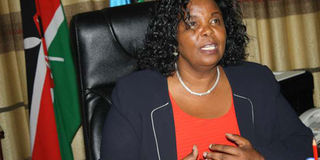Varsities seek a piece of Sh17bn laptop cash pie

Kenyatta University Vice-Chancellor Prof Olive Mugenda speaks to journalists in her office on January 23, 2015. Kenyatta University and seven others are the lead bidders for the Sh17 billion laptop tender. PHOTO | ANTHONY OMUYA | NATION MEDIA GROUP
What you need to know:
- The government promised to give every Standard One pupil a laptop, but has so far been unable to contract a supplier because of disputes and allegations of corruption.
- The government hopes to give the laptops to 22,000 primary schools, a promise it made at the last elections.
- The eight are Kenyatta University, Dedan Kimathi University, Moi University, Jomo Kenyatta University of Agriculture and Technology and the University of Nairobi (UoN) as the lead bidders.
- The winners are expected to supply 1.2 million pupils in public primary schools with laptops next year.
Eight universities have been selected to participate in the Sh17 billion laptop tender.
The government promised to give every Standard One pupil a laptop, but has so far been unable to contract a supplier because of disputes and allegations of corruption.
The short-listing of suppliers is a sign of hope that the computers and content for pupils might be delivered after all.
Eight out of the 10 consortia in the final list released by the government on Wednesday evening are either led by, or have a local university as participants.
Three out of the 10 will be given the job of supplying the hardware as well as the learning material.
Expertise in developing knowledge for children is what has given the universities an edge.
The government hopes to give the laptops to 22,000 primary schools, a promise it made at the last elections.
But implementing the project has been dogged by controversy, after an initial award was cancelled following protests and allegations of corruption in the tender.
The eight are Kenyatta University, Dedan Kimathi University, Moi University, Jomo Kenyatta University of Agriculture and Technology and the University of Nairobi (UoN) as the lead bidders.
Strathmore Research and Consultancy Centre (SRCC), an affiliate of Strathmore University, is also playing a key role in its consortium.
Technical University of Kenya and Multimedia University are supporting bids by Smoothtel & Data Solutions Ltd, and Symphony Technologies Ltd, respectively.
Meru University of Science and Technology is supporting the bid fronted by Dedan Kimathi University.
Equity Group Holdings is the only local financial institution seeking to participate.
Only two of the big laptop manufacturers — Lenovo and Hewlett Packard — are short-listed, with HP going it alone.
BOUNTIFUL TENDER
The winners are expected to supply 1.2 million pupils in public primary schools with laptops next year.
“The Ministry of ICT, through the Digital Literacy Programme Secretariat has today released the bid document to 10 shortlisted companies for the supply, installation and commissioning of the Digital Learning Solution for the 22,000 public primary schools,” said a statement by the ICT Authority on Wednesday evening.
A bidders’ meeting is to be held on Thursday next week at the ICT Authority offices for the participants to be given more details to help them prepare their final bids.
Preparation of the final short-list from the 25 bidders was delayed for two months because there was no money.
There were fears that the project would be postponed come January, when the laptops were meant to be delivered.
The short-listed bidders are expected to give their proposals in 42 days.
Three successful bidders will be chosen to undertake a proof of concept on the programme.
Contracts will then be awarded to them for the rollout to public primary schools.
Successful firms will be required to deliver and install computers to schools.
FAIR GAME
There will be laptops for teachers, learners and special needs pupils.
The firms will also be required to deliver and install servers, routers and projectors to the primary schools countrywide.
They must have local assembly plants, which the government believes will be a way of cutting costs by reducing bulk import.
“There is no bias in the tendering process, no predetermined bidder,” said ICT authority director of corporate affairs Felix Ongaga.
The contract was first awarded to Olive Telecommunications but it was revoked by the Public Procurement Administrative Review Board last year.
In May, President Uhuru Kenyatta transferred the project from the Ministry of Education to that of Information and Communications Technology and asked the Energy and Industrialisation ministries, together with the Attorney-General, and The National Treasury, to help.
However, the ministry of Education’s push to increase the project cost to Sh19.5 billion could re-ignite the controversies afresh.





